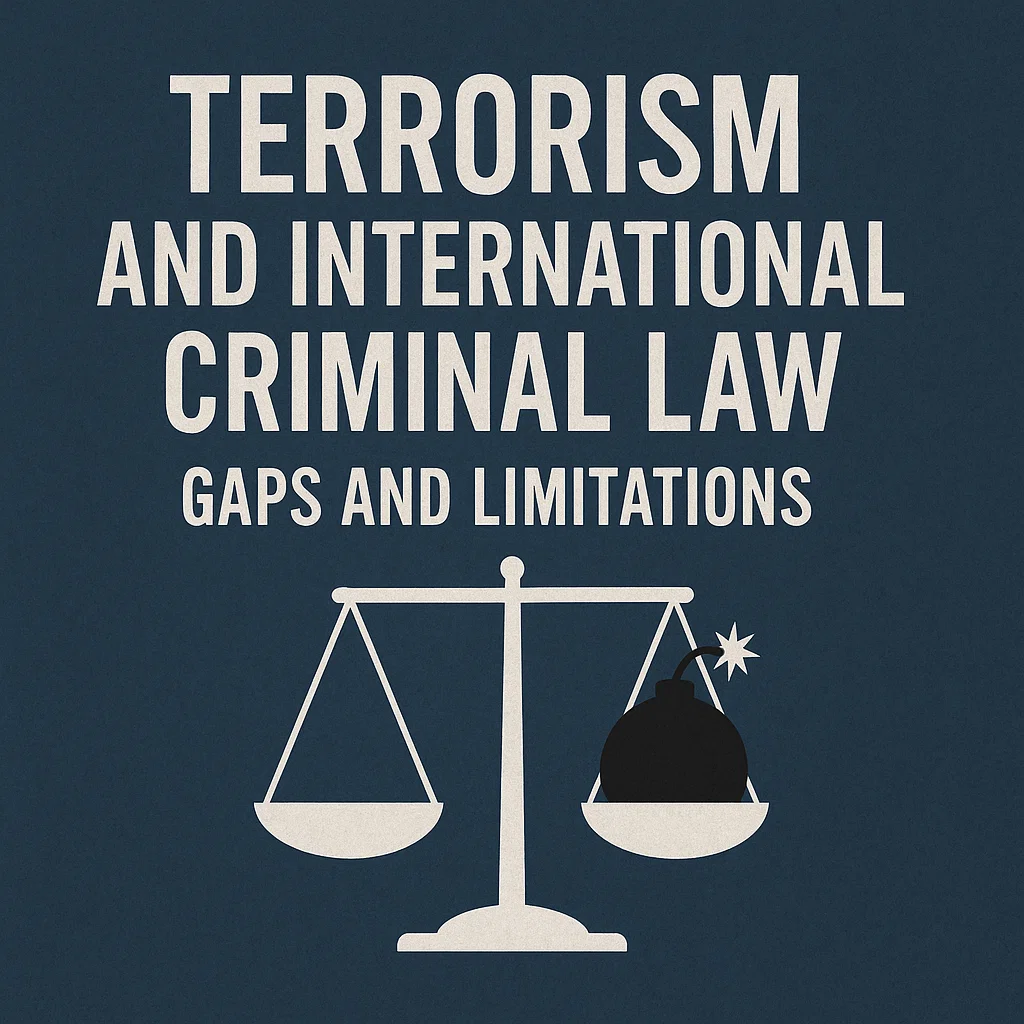Terrorism And International Criminal Law : Gaps And Limitations
Terrorism is established as one of the most persistent and destabilizing threats to international peace and security in the 21st century. From coordinated transnational attacks like 9/11 to homegrown violent extremism, terrorism challenges state sovereignty, undermines human rights, and fuels cycles of violence and repression. While international criminal law (ICL) has evolved to address heinous , brutal crimes like genocide, crimes against humanity, and war crimes, the international community continues in constantly struggling with how to incorporate terrorism within this framework. Despite the global recognition of terrorism as a major international threat, there remains no universally accepted definition, and its inclusion in International Criminal law mechanisms remains limited and fragmented.
The article explores the relationship between terrorism and international criminal law, focusing on the gaps, limitations, and the legal-political challenges that highly hinder comprehensive accountability for terrorist acts on a global scale.
Criminal law plays a central role in combating terrorism by providing the legal framework to define, prosecute, and punish terrorist acts. As terrorism poses grave threats to national and international security, criminal law systems have evolved to address its unique challenges. While approaches vary by jurisdiction, the core objective remains the same: to prevent acts of terror, hold perpetrators accountable, and uphold the rule of law.
One of the core obstacles to addressing terrorism under international criminal law is the absence of a universally accepted legal definition. Over the decades, multiple international conventions have attempted to address aspects of terrorism, such as:
- The 1970 Hague Convention for the Suppression of Unlawful Seizure of Aircraft
- The 1997 International Convention for the Suppression of Terrorist Bombings
- The 1999 International Convention for the Suppression of the Financing of Terrorism
However, these conventions define terrorism narrowly and issue-specifically, avoiding a comprehensive, cross-cutting highlighting definition of terrorism itself. Efforts to adopt a broad definition at the United Nations, particularly through the Draft Comprehensive Convention on International Terrorism (CCIT), have been stalled due to political disagreements, especially on whether acts committed by liberation movements or during armed conflicts should be included.
The key challenge explains state should have divergent views on whether to include state-sponsored acts, resistance movements, or acts committed during armed conflicts within the definition of terrorism.
Terrorism and the International Criminal Court (ICC)
The Rome Statute of the International Criminal Court (1998) established jurisdiction over four major international crimes: genocide, crimes against humanity, war crimes, and the crime of aggression. Notably, terrorism is not listed as a separate, stand-alone crime.
Some of the acts of terrorism fall under existing crimes , particularly :
- Crimes against humanity: If the terrorist acts are widespread or systematic and directed against civilians.
- War crimes : If committed during an armed conflict, such as attacks on civilians or civilian infrastructure.
- Genocide : If the terrorist intent aligns with targeting a national, ethnic, racial, or religious group with intent to destroy it in whole or in part.
However, most terrorist acts—such as bombings in peacetime, isolated attacks, or cyber-terrorism—fall outside the scope of the Rome Statute.
Fragmentation of Legal Frameworks
Instead of a unified international legal mechanism to prosecute terrorism, the world relies on a fragmented framework of over a dozen sectoral treaties. These treaties mandate states to criminalize certain terrorist acts, cooperate in investigations, and extradite suspects, based on principles
- Are often inconsistently implemented
- Lack centralized enforcement mechanisms
- Depend heavily on state cooperation and national legal systems
Moreover, regional organizations like the European Union, African Union, and Organization of American States have developed their own counter-terrorism frameworks, adding further layers of legal complexity.
Political Obstacles and Selective Enforcement
Terrorism is a politically charged label. States often use it to delegitimize opposition groups, while others may protect or support certain non-state actors. This politicization has hindered consensus on legal norms and fueled accusations of **selective justice** in international enforcement.
Lack of consensus , organised laws and political will significantly hampers legal accountability for acts of terrorism at the international level.
The Challenges of Non-State Actors
International criminal law traditionally focused on state actors or individuals acting under state orders. However, terrorism is primarily perpetrated by **non-state actors**, often operating across borders and outside the conventional structures of war.
This poses significant legal and practical challenges:
- Jurisdictional gaps: Terrorist groups often operate in failed or fragile states, where judicial systems are weak or nonexistent.
- Evidentiary issues : Gathering evidence against non-state groups in conflict zones or clandestine networks is extremely difficult.
- Accountability structures : Unlike armies, many terrorist organizations lack a clear command hierarchy, complicating efforts to attribute individual responsibility.
- Emerging Forms of Terrorism: Legal Lag : Modern terrorism has evolved. Today, terrorism may involve cyber-attacks, bioterrorism, lone-wolf attackers, and the use of drones or artificial intelligence. International legal instruments, however, lag behind in addressing these threats.
For instance :
Cyber-terrorism : lack of dedicated legal mechanisms at the international level.
Online radicalization and recruitment : It remain under-regulated, especially on social media.
AI-enabled weaponry : An autonomous drone strikes by non-state actors are not yet covered in most treaties.
Many states have adopted anti-terrorism laws with broad definitions, special courts, and exceptional measures like extended detention or secret trials.
While these laws may fill gaps left by international instruments, they raise significant human rights concerns including:
- Arbitrary detention
- Torture or ill-treatment of suspects
- Suppression of political dissent
- Racial and religious profiling
Special Legal Procedures and Courts : As terrorism is highly viewed as a national security threat, many legal systems allow for special procedures in terrorism-related cases. This includes :
- Extended pre-trial detention
- Closed-door trials
- Use of secret evidence or intelligence sources
- Special anti-terrorism courts or fast-track procedures
While these measures aim to ensure swift, organised and effective justice, they can raise human rights concerns, especially regarding due process, fair trial rights, and protections against arbitrary detention.
Investigation and Evidence : Investigating terrorism poses unique challenges due to the serious transnational nature of terrorist networks. Criminal law enables the use of enhanced investigative tools such as:
- Surveillance and wiretapping
- Undercover operations
- International cooperation (extradition, mutual legal assistance)
- Asset freezing and financial tracking
Regional law enforcement bodies play key roles in transnational investigations, as terrorism frequently involves cross-border planning, funding, and coordination.
Criminal law increasingly incorporates preventive strategies to disrupt terrorism before attacks occur. These include criminalizing preparatory acts, such as training, radicalization, or possession of bomb-making materials. Some countries also use administrative detention or control orders, allowing restrictions on suspects even without formal charges, though such practices are controversial.
Concluding thoughts ….
Criminal law is a vital, influential instrument in the fight against terrorism, offering the legal means to prosecute and deter individuals and groups who threaten peace and security. However, its effectiveness must be balanced with respect for fundamental rights and legal safeguards. As terrorism continues to evolve, so too must criminal law, ensuring it remains both robust and just.
Despite the global consensus that terrorism poses a severe threat to international peace and human dignity,
Understanding the seriousness of rising terrorism and posing threat to international peace, international criminal law has been developed as comprehensive and effective mechanism.
To close these gaps, the international community setting to invest in legal reform, depoliticize the counter-terrorism agenda, and building institutions capable of addressing the evolving nature of terrorist threats. Without such measures, international criminal law will remain an incomplete tool in the global fight against terrorism, and impunity for perpetrators will persist in many regions of the world.
Criminal Law chooses to be both proactive and reactive assuring to adopt quickly towards the current forms of terrorist threats .
A bomb may silence thousand cries , shattering lives, but highly organised international criminal law revies what violence denies.
Through courts, laws , regulations settled the justice that speaks our identity . “
Author By
First author : Rahul Sharma LLM 2nd semester, SRM university , Delhi NCR , Sonipat, Haryana .
Second Author : Dr. Anjali dixit , associate professor , faculty of law, SRM university , Delhi NCR , Sonipat, Haryana .


